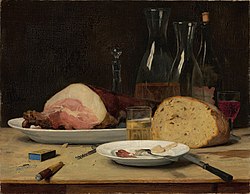Outline of meals
This article needs additional citations for verification. (January 2013) |
| Part of a series on |
| Meals |
|---|
 |
| Meals |
| Components and courses |
| Related concepts |

A meal is an eating occasion that takes place at a certain time and includes specific, prepared food, or the food eaten on that occasion.[1][2] The names used for specific meals in English varies greatly depending on the speaker's culture, the time of day, or the size of the meal.
Meals occur primarily at homes, restaurants, and cafeterias, but may occur anywhere. Regular meals occur on a daily basis, typically several times a day. Special meals are usually held in conjunction with such occasions as birthdays, weddings, anniversaries, and holidays. A meal is different from a snack in that meals are generally larger, more varied, and more filling than snacks.
Mealtimes
Common meals


The type of meal served or eaten at any given time varies by custom and location. Further, the names of meals are often interchangeable by custom as well. Some serve dinner as the main meal at midday, with supper as the late afternoon/early evening meal; while others may call their midday meal lunch and their early evening meal supper. Except for "breakfast", these names can vary from region to region or even from family to family.
- Breakfast is eaten within an hour or two after a person wakes in the morning.[3]
- Lunch or dinner is eaten around mid-day, usually between 11 am and 2 pm. In some areas, the name for this meal depends on its content.[4]
- Supper or dinner is eaten in the evening. In some areas, the name for this meal depends on its content, but many English-speakers use "dinner" for this meal regardless of size.[5]
Other meals
- Second breakfast is a traditional mid-morning meal served in parts of central Europe, i.e.: Austria, Bavaria (Germany) and Poland
- Elevenses, also called "morning tea", is a drink and light snack taken late morning after breakfast and before lunch.
- Tiffin is a second breakfast or light lunch, most commonly in India.
- Brunch is a late-morning meal, usually larger than a breakfast and usually replacing both breakfast and lunch; it is most common on Sundays.
- Yum cha is a Cantonese morning or afternoon meal where tea and dim sum dishes are served.
- Afternoon tea is a mid-afternoon meal, typically taken at 4 pm, consisting of light fare such as small sandwiches, individual cakes and scones with tea.[6]
- High tea is a British meal usually eaten in the early evening.[6]
- Last meal is a meal served to a prisoner before his execution.
- A multi-course meal is a meal of multiple dishes served in sequence, generally eaten only in the most formal contexts.
- A picnic is an outdoor meal where one brings one's food, such as a sandwich or a prepared meal (sometimes in a picnic basket). It often takes place in a natural or recreational area, such as a park, forest, beach, or lawn. On long drives a picnic may take place at a roadside stop such as a rest area.
- A banquet is a large, formal, elaborate meal, with many guests and dishes.
See also
References
- ^ meal noun (FOOD) - definition in the British English Dictionary & Thesaurus - Cambridge Dictionaries Online
- ^ meal - Definition from Longman English Dictionary Online
- ^ "AskOxford: breakfast". Retrieved 2008-07-20.
- ^ "AskOxford: lunch". Retrieved 2008-07-20.
- ^ "Definition of supper". Retrieved 2012-07-10.
{{cite web}}: Unknown parameter|deadurl=ignored (|url-status=suggested) (help) - ^ a b "AskOxford: tea". Retrieved 2008-07-20.
External links
- “What Time is Dinner?”, a historian looks at the evolution of mealtimes.
- “Small meals or big ones?”, a comparison of the number of meals taken per day.
